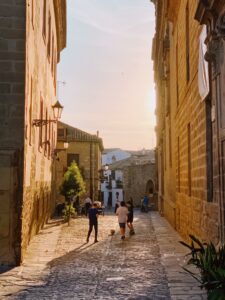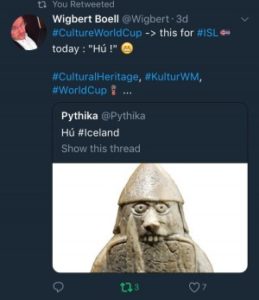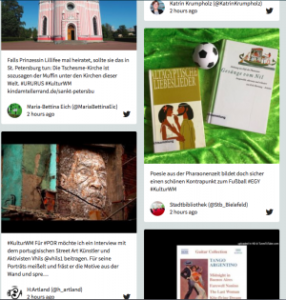#CultureEuro
#CultureEuro – a hashtag game – its beginnings & some “rules”
The joy of exchanging tips, facts and information with other like-minded individuals in real-time during one event … this is at the heart of #socialmedia. Add to this the seemingly endless treasure chests of cultural history, heritage and creativity in Europe, mix it with the excitement of discoveries, garnished with a common understanding of diversity in unity – and you may become the essence of #CultureEuro.

With the upcoming #Euro2020 football European championship (moved to 2021 because of Corona), it is time to revive the idea of the #CultureWorldCup from 2018, which started as an idea to escape boring football matches: Discover and learn more about the Culture (!) of the participating nations in that match, at the same time – while we were watching.
the beginnings
The idea was born by a sudden inspiration from a twitter colleague in the German twittersphere Harald Link – @haraldlink as #KulturWM (see the story in German here), but quickly gained traction and people began exchanging cultural tips from the countries, which were playing, even when the games were not boring anymore.
What is your favourite team during the #Euro2020? Do you have also countries, you frequently travel to; places you are in love with; music, you would like to share; literature, you can not do without…?
In 2018, for some countries, famous monuments immediately came to mind, such as the Pyramids or the Sagrada Familia, but we thought they were all too obvious choices and in any case well-known cultural #WorldHeritage – at least for the common culture-savvy readership. So, the hashtags #KulturWM & #CultureWorldCup grew into something more: a challenge to discover something rather unknown – like Carmen Lyra, a writer from Costa Rica, or the art museum in Osaka, Japan. Hidden discoveries were what made #CultureWorldCup as a social media game special. It is a game of discovery and personal preference. 
In this spirit, #CultureEuro enters as a friendly game of #CulturalExchange. This is not a competition, but a joint discovery.
some suggested rules
#CultureEuro is of course an open-to-all & non-controlled hashtag – however there are some suggested rules:
-
share culture about a country, which is currently playing
-
and maybe in the time period before this match – but preferably after all other games are finished
-
use the usual hashtag identifier with country codes – e.g.: #TURITA for the opening game Turkey-Italy (a list of the FIFA country codes is here)
-
#hashtags: #CultureEuro, #Euro2020, #CultureEuro2020 (German: #KulturEM)
-
share culture, which is not all too obvious (e.g.: “Eiffel Tower” for France), but rather hidden gems
-
no selfies or self-promotion
-
it is all about culture
-
respect & tolerance (no politics)
-
have fun & enjoy
The last time, a never-ending flow of culture tips made for very exciting reading to follow along or re-read (even if some tips became occasionally repetitive). Also, the game comes with an added bonus: We Cultural Creatives – mostly reluctant to identify with simplistic nationalistic ideas – cleverly used the #CultureEuro hashtag to complement our own soccer enthusiasm. Each football-match gives us the opportunity to do both: step outside the confines of match-watching and engage meaningfully in additional intellectual, creative and audiovisual ways.

We exchange ideas about the “cultural products” – our common cultural heritage. The schedule of the competition artificially limits the choice, but it also provides a framework that keeps our discovery trips just manageable. Already 32 countries offer such a variety of culture that reading the ideas and tips on the Social Wall is hardly manageable.
An overview of the countries and the matches you can find in the official match calendar by UEFA here.
what to share
While the variety of discoveries is progressively limited to a reduced number of countries, it is impressive, how much is to be discovered within them. Take #CulturalHeritage places like the Botanical Garden of the National Palace in Queluz, Sintra in #Portugal (#POR) which received an European Heritage Award in 2018 by EuropaNostra (a great resource).
Maybe you want to share some unique knowledge: ever heard about the late Phil Tanner (1862-1950), a folk singer and storyteller from #Wales (#WAL) – which I recently discovered in this large treasure chest: the digital archives from Europeana.
For more inspiration just think about some of your own favourite music, films, museums, theatres, opera houses, books, painters, sculptors, dance performances, historical buildings, musicians, cultural heritage places, writers …
There is so much discover, once you start digging. Check out the European Film Gateway, where you can find a 9-min documentary from 1949 about the Danish (#DEN) sculptor Bertel Thorvaldsen (1770-1844) …

well, in any case …
Enjoy the games AND the #CultureEuro.
Cheerio!
Wigbert Boell
Here are two screen shots from 2018


